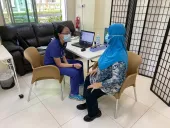
Singapore needs to control inpatient costs amidst high medical inflation
High medical fees still drive inflation even if it has dropped from 20% to 9.6% in three years.
According to the Aon Medical Inflation Index (AMII), which compares the average medical inflation rate in each location for 2017 and 2018 with a projected inflation rate for the next three years, Singapore scored 95.1—lagging behind the regional median AMII score of 82.7 and the 8th highest of the markets surveyed.
Costs remain high even if the medical inflation in Singapore has dropped from 20% in 2014 to 9.6% in 2017. The country narrowly avoids joining the high inflation markets of Pakistan (115.3), Malaysia (132.4), and Vietnam (164.5).
The index revealed that in Singapore, there is also a growing incidence of chronic illnesses amongst its residents. “Not only does this decrease their quality of life, it makes them less productive—which has direct and adverse impact on the economy,” Aon said.
The company noted that managing the disease burden and cost of healthcare is a priority, and some of the most popular initiatives include restricting specialist access to patients with General Practitioner (GP) referrals and pre-authorisation of high cost inpatient procedures. “GPs have also been successful in dispensing generic medications instead of more expensive patent equivalents,” it added.
Meanwhile, insurers are still divided in terms of the outlook of medical inflation over three years in the country.
The index states that inpatient costs (100%) are the primary driver of inflation, with surgery costs experiencing the greatest increase in Singapore. At the outpatient level, diagnostic costs (50%) outweighed medical fees (25%)—a trend driven by an ageing population and high prevalence of non-communicable diseases such as cardiovascular diseases and cancers.
Despite the overall optimism, the report noted that there is still plenty to be done to curb medical inflation in Singapore, “starting with medical insurers and healthcare providers working together on chronic disease management programmes, and companies encouraging their employees to participate in wellness programmes,” it added.
Aon Asia Pacific health & benefits CEO Tim Dwyer noted that private healthcare systems work best in tandem with vibrant public systems, as we’ve seen in markets such as Thailand, South Korea, and especially Singapore—which has effectively halved its medical inflation rate over recent years. “This is due to the concerted cost management efforts of consumers, healthcare providers, and medical insurers that provide effective management of the outpatient claims experience. Employers also have a significant part to play by investing in innovative benefits that promote wellness, and facilitate early detection of chronic illnesses such as cardiovascular disease and hypertension. These efforts will also help them increase productivity, differentiate their employer brand, and gain competitive business advantage,” he added.













 Advertise
Advertise













